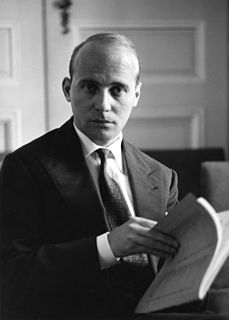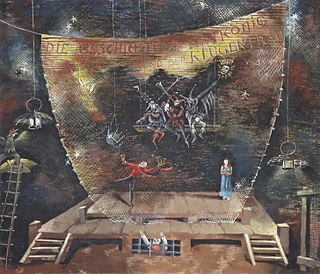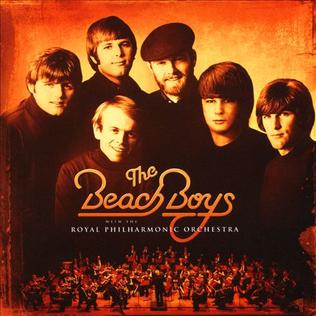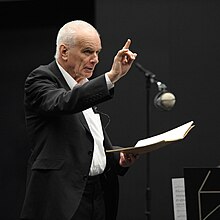Mark-Anthony Turnage CBE is an English composer of classical music.

The Nose, Op. 15,, is Dmitri Shostakovich's first opera, a satirical work completed in 1928 based on Nikolai Gogol's 1836 story of the same name.

Die Frau ohne Schatten, Op. 65, is an opera in three acts by Richard Strauss with a libretto by his long-time collaborator, the poet Hugo von Hofmannsthal. It was written between 1911 and either 1915 or 1917. When it premiered at the Vienna State Opera on 10 October 1919, critics and audiences were unenthusiastic. Many cited problems with Hofmannsthal's complicated and heavily symbolic libretto. However, it is now a standard part of the operatic repertoire.
The Young Person's Guide to the Orchestra, Op. 34, is a 1945 musical composition by Benjamin Britten with a subtitle Variations and Fugue on a Theme of Purcell. It was based on the second movement, "Rondeau", of the Abdelazer suite. It was originally commissioned for the British educational documentary film called Instruments of the Orchestra released on 29 November 1946, directed by Muir Mathieson and featuring the London Symphony Orchestra conducted by Malcolm Sargent; Sargent also conducted the concert première on 15 October 1946 with the Pool Philharmonic in the Philharmonic Hall, Liverpool, England.
Ivan the Terrible, Op. 116, is the score composed by Sergei Prokofiev for Sergei Eisenstein's film Ivan the Terrible (1942–45) and its sequel (1946), the first two parts of an incomplete trilogy. The project was Prokofiev's second collaboration with Eisenstein, the first being the popular Aleksandr Nevskiy (1938). The majority of the non-liturgical song texts were written by Vladimir Lugovskoy, who collaborated with Prokofiev on the texts for Aleksandr Nevskiy.

The Canterville Ghost, an opera by the Russian composer Alexander Knaifel in three acts for 18 singers and chamber orchestra, also in an abridged version for two soloists and chamber orchestra.

The Bassarids is an opera in one act and an intermezzo, with music by Hans Werner Henze to an English libretto by W. H. Auden and Chester Kallman, after Euripides's The Bacchae.

König Hirsch is an opera in three acts by Hans Werner Henze to a German libretto by Heinz von Cramer after Il re cervo, a theatrical fable (1762) by Carlo Gozzi. He revised it as Il re cervo, premiered in 1963 at the Staatstheater Kassel.
Hendrik Pienaar Hofmeyr is a South African composer. Born in Cape Town, he furthered his studies in Italy during 10 years of self-imposed exile as a conscientious objector. While there, he won the South African Opera Competition with The Fall of the House of Usher. He also received the annual Nederburg Prize for Opera for this work subsequent to its performance at the State Theatre in Pretoria in 1988. In the same year, he obtained first prize in an international competition in Italy with music for a short film by Wim Wenders. He returned to South Africa in 1992, and in 1997 won two major international composition competitions, the Queen Elisabeth Music Competition of Belgium and the first edition of the Dimitris Mitropoulos Competition in Athens. His 'Incantesimo' for solo flute was selected to represent South Africa at the ISCM World Music Days in Croatia in 2005. In 2008 he was honoured with a Kanna award by the Kleinkaroo National Arts Festival. He is currently Professor and Head of Composition and Theory at the South African College of Music at the University of Cape Town, where he obtained a DMus in 1999.

The Devil in Love is an opera in three acts by Alexander Vustin. The libretto was written in Russian by Vladimir Khachaturov, based on the 1732 novel The Devil in Love by Jacques Cazotte. Completed in 1989, it was premiered on 15 February 2019 at the Stanislavski and Nemirovich-Danchenko Theatre in Moscow.

Die Kluge. Die Geschichte von dem König und der klugen Frau is an opera in 12 scenes written by Carl Orff. It premiered at the Frankfurt Opera, Germany, on 20 February 1943. Orff referred to this opera as a Märchenoper. The composer also wrote the libretto, based on "Die Kluge Bauerntochter" from Grimms' Fairy Tales. A performance lasts for about 90 minutes and is often paired with Orff's Der Mond.

Hans Werner Henze composed the nine Sacred Concertos that comprise his Requiem over the course of three years from 1991 to 1993 on commissions from the London Sinfonietta, Suntory Corporation for the NHK Philharmonic, and Westdeutscher Rundfunk, Cologne. The first movement, Introitus: Requiem Aeternam was commissioned by the London Sinfonietta as part of a memorial concert for Artistic Director Michael Vyner who died on 20 October 1989. In addition to Henze, the London Sinfonietta also commissioned seven other prominent composers to write works in Vyner's memory to make up the program which was performed on the 6 May 1990.

Der Mond is an opera in one act by Carl Orff based on a Grimm's fairy tale with a libretto by the composer. It was first performed on 5 February 1939 by the Bavarian State Opera in Munich under the direction of Clemens Krauss. The composer describes it not as an opera but as Ein kleines Welttheater ; the performance lasts for about one hour and is often paired with Orff's Die Kluge.

Rita Coolidge is the self-titled debut album by Rita Coolidge.
The Sacrifice is an opera in three acts composed by James MacMillan with a libretto by the poet Michael Symmons Roberts based on the Branwen story of the Welsh mythology collection, the Mabinogion. The world premiere took place on 22 September 2007 at the Donald Gordon Theatre of the Wales Millennium Centre, Cardiff. The production was staged by Welsh National Opera, directed by Katie Mitchell and conducted by the composer.

Janet Maguire was an American composer born in Chicago, resided in Venice, Italy.
John Corigliano's Symphony No. 1 for Orchestra was written between 1988 and 1989 during the composer's tenure as the first Composer-In-Residence for the Chicago Symphony Orchestra. The symphony's first performance was by the Chicago Symphony conducted by Daniel Barenboim on March 15, 1990.
Charlotte Bray is a British composer. She was championed by the Royal Opera House Covent Garden, London Sinfonietta and Birmingham Contemporary Music Group, BBC Symphony Orchestra. Her music has been performed by many notable conductors such as: Sir Mark Elder, Oliver Knussen, Daniel Harding, and Jac van Steen.
Mothership is a single-movement composition for orchestra and electronica by the American composer Mason Bates. The piece received its world premiere March 20, 2011 at the Sydney Opera House by the YouTube Symphony Orchestra under Michael Tilson Thomas, with featured improvisatorial soloists Paulo Calligopoulos on electric guitar, Ali Bello on violin, Su Chang on zheng, and John Burgess on bass guitar. The premiere was broadcast live on YouTube and garnered nearly two million viewers.

The Beach Boys with the Royal Philharmonic Orchestra is a 2018 album of remixed Beach Boys recordings with new orchestral arrangements performed by the Royal Philharmonic Orchestra. It was produced by Nick Patrick and Don Reedman, who conducted similar projects for Roy Orbison and Elvis Presley.











